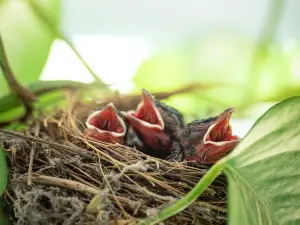
Mother birds are some of the most devoted mothers in the animal kingdom, they have to be, baby birds are quite fragile and delicate, anything can easily kill them. Yet, bird mothers will leave their babies on occasion.
So, do mother birds leave their birds at night? This article looks into it
Mother birds do usually leave their babies at night, that is, if the babies are fledglings. If the babies are nestlings then the mothers will sleep in the nest with them
Table of Contents
Do mother birds leave their babies at night?
A mother bird will usually be very attentive to her babies, she will be fiercely protective over them but this does not mean that she will stay with her babies at night, in fact, she will sleep elsewhere if the baby birds are developed enough.
Hatchlings/Nestling:
Baby birds, who have just been born, who have no feathers or fluff, only skin, and who can not regulate their body temperature are called nestlings, they become hatchlings when they grow downy fluff that will become new feathers in the next stage of life.
Mother birds will stay with these birds at night and won’t leave their side.
She’ll stay with these birds in order to share her body heat with them and to keep them protected from predators.
If hatchlings/nestlings are left alone at night without their mothers, when the weather is colder, then they can lose body heat and develop chills. If hatchlings lose too much body heat they can die.
The mother bird will place her babies against a bare patch of skin on her belly (the brood patch) at night, this patch of skin is engorged with blood vessels that release heat and help keep the babies warm.
A bird mother will also cover her babies with feathers and create an insulated little environment for them, this environment keeps them warm at night.
Fledglings:
Baby birds will eventually grow feathers and these feathers will allow them to regulate their own body heat, the birds are called fledglings at this stage. Mother birds stop sleeping in the nest with their babies when the babies become fledglings.
Fledglings are much bigger than nestlings and thus take up more space in the nest, the family cannot sleep in the same nest because there isn’t enough room. Because of this, the parents are forced to sleep elsewhere
In addition, adult birds are easier to spot by predators than baby birds are. If a mother bird decides to sleep in the nest, she’ll draw attention to herself and put the whole family at risk of being found and eaten by a predator
She will leave the nest and sleep elsewhere. That’s not to say that she abandons her babies, she will find a place close to the nest where she can see her babies if something happens.
She will choose to sleep somewhere safe from predators: perched high in tree foliage, in dense foliage, in tree trunks, and in cavities if in the wild. Mother birds will sleep in barns, roofs, and ledges if they are in urban areas.
FAQ:
Do birds get sad when their babies leave?
Yes, while it is normal and natural for baby birds to leave their parents’ nest when they are ready, this leaving is not easy
Birds are social animals, and the parents will become sad when their baby birds leave the nest to start their own lives.
Where does the dad bird sleep at night?
The parent birds, both the mom and the dad, will sleep in the nest at night. They do this to keep the eggs and baby birds warm.
Father birds are involved in their offspring’s lives, they are devoted dads
How long can baby birds live without their mom?
Hatchlings can only survive a couple of hours without their mom, not only will they need to be fed by their mothers,, but they will chill too quickly if their mothers are not keeping them warm.
They can die of cold within a couple of hours of the mother being away
Although the nest helps to keep the baby birds warm at night when she is away, this will not be enough to keep the hatchlings warm for long periods of time.
Yes, nests are built to keep baby birds warm, they are built using insulation like fur, grass, mud, and lichen in the wild, as well as yarn and plastic in urban areas, but unfortunately, this isn’t enough for hatchlings
Fledglings, on the other hand, can survive longer without their mothers but they still need to be fed by their mothers in order to survive.
Parent birds leave the nest during the day and go out looking for food. Fledglings need to be fed every 24 hours at least, but their parents will usually be back after 3-4 hours.
Conclusion
In conclusion, mother birds will leave their babies at night depending on how developed the baby birds are.
Hatchlings/nestlings, who need the body heat of their mothers, will not be left alone at night but fledglings, which are feathered and can regulate their own body temperature, will be left alone.
Leaving fledglings alone gives them more room to sleep and avoids attracting predators
If you enjoyed this article then you may also be interested in other baby bird related articles. Here are some articles that you may be interested in: Why Is My Baby Bird Shaking?, How To Protect Baby Birds From Crows, Do Birds Mourn The Loss Of Their Nest?, Do Bird Beaks Grow?, Do Mother Birds Sit On Their Babies After They Hatch?

